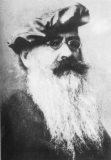I hadn't intended on making this into this type of "series," but as there are connections to the larger Alpine peoples of ancient times, I see fit to keep adding to this. One area, in which I had not anticipated tie-ins to our culture, was the connection of "primal words." However, some of List's concepts, especially regarding the precise fabric of ancient word patterns, are so deep that one would need to buy the book.
List seemed to believe that Wotanism was too large of a concept for the average person's daily life. He believed in what he called "Armanism," which was basically an elite priesthood who could study the finite details of the ancient concepts, and interpret it for the larger society. List believed that spirituality, art, science, architecture, education, etc., were "all one" within the Wotanist culture in ancient times. If ever was there a religion or spiritual tradition which did not conflict with science, it was Wotanism.
To clarify once again, I use the word "Wotanism" in the sense that it seems to tie in more with the expression of Odinism in central Europe, not the mainstream incarnation and related perception of the word. "Odinism" even specifically sounds Scandinavian. Actually, much of what is modern Odinism or Ásatrú, is largely "Norse mythology." If you look at Gaulish or Slavic spirituality and myth, it has close ties to Wotanism. Either through direct migration, or through more subtle spiritual influence, often the ancient spiritual traditions more-or-less referred to the same "All Father" (Wotan). Therefore, when I use "Wotanism," I'm referring to the larger European whole, usually in ancient times.
Guido von List's Armanic ideas were strongly entertained, long after his death, by the National Socialists; and it developed (along with the work of others) into what was called "Ariosophy," which was similar to List's Armanism. I just don't see exactly how that has to do with von List? Consequently, the Armanic concept itself has been demonized. People from the Tre Valli Bresciane ("Three Brescian valleys"), our people, invented the "hand held cannon" five centuries ago. Does this mean that our culture should be vilified as a result of how many people have been shot during the past five centuries?
I was going to place some Wikipedia text regarding Armanism here, but it was just "too anti-von List." It's like Christopher Columbus. He was a hero in his day, and a bad guy today; all because some "social scientist" who never placed his fingers in the Earth's soil or hammered in a single nail, said so. Of course, there's also the factor that our own Camunian ancestors were killed for their pagan faith; so wouldn't von List have been a hero to them, especially during "the burning times"? Perhaps we should consider this before we automatically demonize von List. I'm going to put out some information here soon which will really show what the Catholic officials and the Venetian state thought of us. They believed that we were a bunch of devils.
 Because many sun symbols, from western Europe to India, have subtle similarities; this also becomes an area of perceived controversy. In other words, if you compare the circular swastika to the Celtic cross, it's quite obvious that it is the same symbol. The Odinic Rite sells t-shirts and material which features the circular swastika with the slogan "Heritage Not Hate." I can think of some symbols which were used politically, and where many innocents perished in its name, and yet not demonized at all. Aside from that, it should be noted that the "sun of the Alps" is a sun symbol as well. Personally, I can't see how anyone can divorce at least the basic Celtic cross--the circular one, crossed in the middle only--from any type of European neo-paganism.
Because many sun symbols, from western Europe to India, have subtle similarities; this also becomes an area of perceived controversy. In other words, if you compare the circular swastika to the Celtic cross, it's quite obvious that it is the same symbol. The Odinic Rite sells t-shirts and material which features the circular swastika with the slogan "Heritage Not Hate." I can think of some symbols which were used politically, and where many innocents perished in its name, and yet not demonized at all. Aside from that, it should be noted that the "sun of the Alps" is a sun symbol as well. Personally, I can't see how anyone can divorce at least the basic Celtic cross--the circular one, crossed in the middle only--from any type of European neo-paganism.
List apparently wrote extensively about old folk traditions which were incorporated into Christianity; which is far from "the concept of renouncing the imposed foreign creed of Christianity and returning to the pagan religions of the ancient Indo-Europeans" (Wikipedia). It appears that most of the anti-von List ideas simply originate from an opportunity by some Christian concerns to smear paganism in general. So, are pagans "far right" now? Again, a good quote regarding 'Secret of the Runes' and von List by an Amazon.com critic:
This is a classic book on runic magic. A lot of New Age writers [copy] his occult ideas. The Right misunderstands him and the Left smears him. One of the most lied about men in occult history.
This book is well worth the price. Even though many of his ideas have been used by other occult writers, and some of his ideas on magic are standard New Age rite, it is always interesting to visit the source where these rivers sprung. Hopefully, all of Von List's books will be made ready to an English speaking market.
--Wyatt Kaldenberg, Amazon.com review
I wanted to add here that many cultures perceive that they lived in a type of paradise at one time, then something happened to foul it all up for them. I think that these ideas are often greatly exaggerated, but do have some truth to them. About as close as it can get to this, at least in the ancient world, seems to be the Etruscan civilization. They didn't have the philosophy and order of the ancient Greeks or Egyptians--although since the Romans destroyed almost all of their text, we'll never know for certain--they had better land and resources, plenty of technology, and were not "war-like." In fact, it appears that they didn't even have a definite bordered "Nation"; hence the name "Etruscan civilization," as opposed to "Roman Empire." As a "Padanist" (or for that matter, a "Langbardist," "Cisalpinist," or "Etrurianist."), I believe that they would have eventually and peacefully merged with the Umbrians, Cisalpine Gauls, Alpine tribes, etc, and formed a "northern nation"; the specific name of which, not being at all important.
 I just didn't want it to sound like I was placing the Etruscans or Umbrians out of my spiritual idealism. Their technology was greater than the Teutons, and their spirituality was on the same level. They seemed to be as close to "living in paradise" as it was possible in the ancient world. The quality of life for the average Roman or Egyptian wasn't very good. There was a tremendous amount of slavery, classism, sexism, and general abuse. I don't just mean that in a modern political usage of terms, but also in a spiritual way. Perhaps the Greeks had something better, but I don't know enough about ancient Greece to say. The ancient Etruscans had great architecture, the institutions of civility, a great farming culture on great land, women had it fairly good, and there just didn't seem to be much strife.
I just didn't want it to sound like I was placing the Etruscans or Umbrians out of my spiritual idealism. Their technology was greater than the Teutons, and their spirituality was on the same level. They seemed to be as close to "living in paradise" as it was possible in the ancient world. The quality of life for the average Roman or Egyptian wasn't very good. There was a tremendous amount of slavery, classism, sexism, and general abuse. I don't just mean that in a modern political usage of terms, but also in a spiritual way. Perhaps the Greeks had something better, but I don't know enough about ancient Greece to say. The ancient Etruscans had great architecture, the institutions of civility, a great farming culture on great land, women had it fairly good, and there just didn't seem to be much strife.
From 'Secret of the Runes' pages 75-76, related to Armanism and society:
All of this is based on the fact that all Aryans or Teutons felt themselves to be one folk. On account of this, every individual, be he free-man or king, had to belong to the provider-class in order to prevent this class, as the main class, from being devalued. Everyone had, therefore, to be a farmer, that is "Ing-fo"--an original maintainer and perpetuator of the ancestors. The second class was the intellectually advanced, the intelligentsia, the rulers, the "teaching-class," to which the skalds, the high nobility, and the kings (princes, counts, etc.) belonged--without ceasing to be farmers. It has already been said on p. 56 above that "ar" means the sun and the law of the sun, and the earn, the eagle [Aar] is its symbol and hieroglyph. Therefore a member of the second class was called an Ar-man or Ir-man, namely a sun-man, Se-man. The Se-mans were the men of knowledge [Wissenden], and from them emerged the skalds--the priests of Wuotan--or better said their core group was the skalds, who, as priests and teachers were also the judges--for in those times "Wihinei" (religion) was simultaneously science and law. one believed what one knew--or at least intuitively recognized, and lived accordingly. Since the Semans, Irminons, Skalds, etc., were one and the same with the scholars, artists, etc., this second class is the "teacher-class"--in spite of the fact that it too belonged to the farmer-class--and is to be recognized as the root area of the activation of the Aryan spiritual work. Therefore, all original lines of the collective arts and sciences are to be derived from it. However, the skalds must remain the central focus in which all the diverse special manifestations of the hieroglyphics can be unified.
.


No comments:
Post a Comment